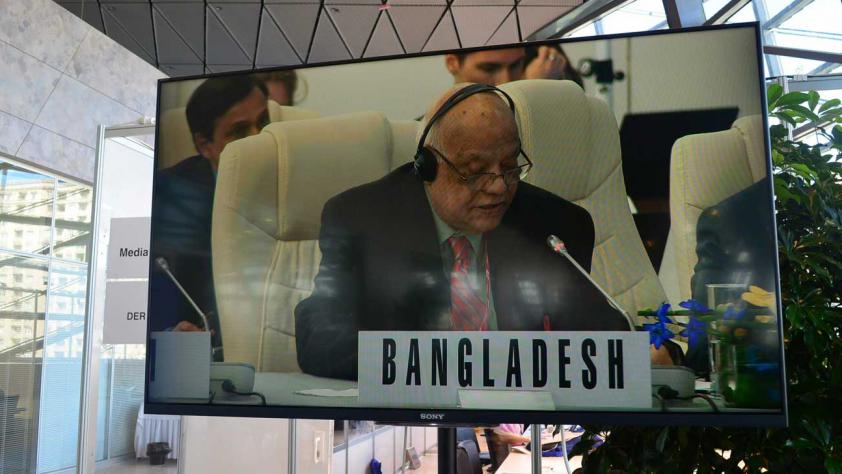Banks join hands with ADB for infrastructure funds
 Finance Minister AMA Muhith is seen on a screen as he speaks at the Asian Development Bank's annual meeting in Baku, the capital of Azerbaijan, yesterday. Muhith asked the ADB to function more from its field offices than from its headquarters. With a cumulative portfolio of $16.34 billion in loans and grants, the ADB remains a key development partner for Bangladesh, he said.
Finance Minister AMA Muhith is seen on a screen as he speaks at the Asian Development Bank's annual meeting in Baku, the capital of Azerbaijan, yesterday. Muhith asked the ADB to function more from its field offices than from its headquarters. With a cumulative portfolio of $16.34 billion in loans and grants, the ADB remains a key development partner for Bangladesh, he said.
The Asian Development Bank has signed an agreement with eight global banks to work together to advise governments on public-private partnership, a move aimed at accelerating the flow of funds into infrastructure projects in developing Asia.
Bangladesh is among seven Asian countries that ADB has identified as potential areas where 30 projects could be implemented at the cost of $20 billion.
The deal is the first formal co-advisory framework between a multilateral development bank and commercial banks, Ryuichi Kaga, head of ADB's Office of Public-Private Partnership, said at a media briefing yesterday on the sidelines of the lender's annual meetings in Baku, the capital of Azerbaijan.
ADB and the commercial banks will advise the Asian governments on how to best structure the PPP projects, make them attractive to the private sector and manage the bidding process. The governments will, however, make the final choice of PPP winning bidders.
Asia's developing nations need to spend $8 trillion until 2020 on infrastructure projects, mainly on energy, roads, railways, ports, airports and water, to keep up economic growth momentum. Growth in Asia and the Pacific remains strong, as ADB expects the region to maintain a growth rate of 6.3 percent this year.
Infrastructure such as transport, energy and water accounts for about 80 percent of ADB's operations.
Infrastructure is not only the basis for economic and industrial development, but also indispensable for human development, raising standards of living and reducing poverty, ADB President Takehiko Nakao said in a statement.
“The public sector alone cannot bridge the region's huge infrastructure financing gaps. Much larger investments from the private sector are needed. We must use public-private partnerships more effectively,” he said.
The region has a remarkable record of fighting poverty. But as recently as 2011, 544 million people were still living under the traditional poverty threshold of $1.25 a day. Last year, ADB developed a new poverty measure taking into account the consumption basket specific to Asia's poor, food costs that rise faster than the general price levels, and vulnerability to economic shocks and natural disasters. If the new poverty measure is applied, the number of absolute poor rises to 1.4 billion, or about 40 percent of the region's total population. “Such high poverty is unacceptable. Poverty must be defeated decisively, and soon,” Nakao said.
In an effort to eliminate poverty and achieve sustainable development in Asia, ADB found Japan, Canada and Australia as early partners in the PPP initiative.
The three countries are providing a total of $64 million to finance preparatory work for the PPP effort, while ADB will contribute $10 million. The combined outlay may climb up to $150 million, with more partners joining in. “Given their huge infrastructure needs, governments in Asia and the Pacific need more options for funding and operational efficiency in infrastructure projects,” Kaga said.
Although there is keen interest to attract private investment into infrastructure, many countries in the region struggle to prepare, structure and place the projects in the market in line with international best practices, Kaga told reporters. The eight banks that will work closely with the ADB are Bank of Tokyo-Mitsubishi UFJ, BNP Paribas, Crédit Agricole, HSBC, Mizuho Bank, Macquarie Capital, Societe Generale and Sumitomo Mitsui Banking Corporation.
ADB, with its co-advisors, will help clients assess the future income flows of projects, bring international best practices to PPPs, and develop PPP capacity in the region to deliver bankable transactions.
News:The Daily Star/5-May-2015



Comments